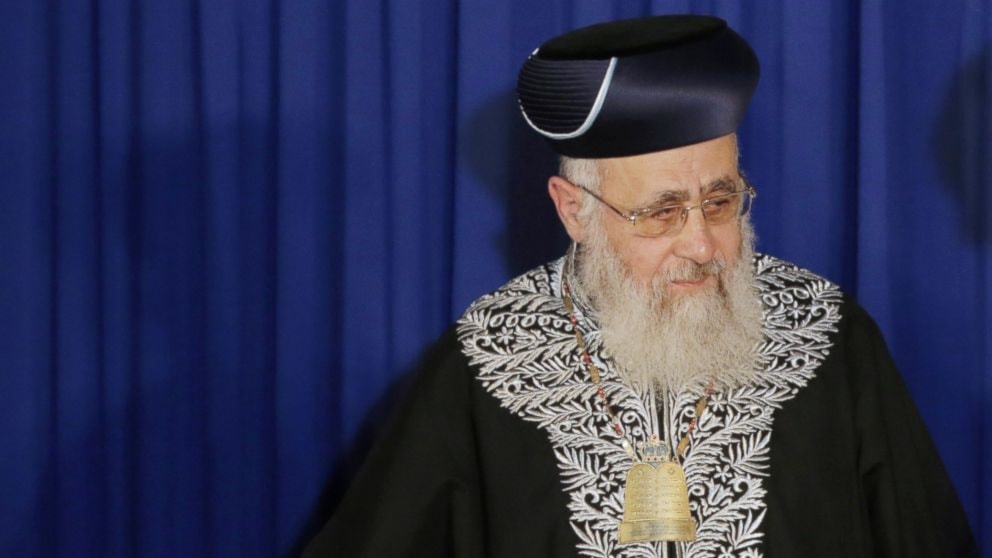Israeli Sephardic Chief Rabbi: We'll leave if army drafting enforced
Israeli Chief Sephardic Rabbi Yitzhak Yosef's threat of a mass departure from the occupation in the event of mandatory military drafting has triggered significant controversy within the occupied territory.
-

Israeli Sephardi Chief Rabbi Yitzhak Yosef in occupied al-Quds on May 26, 2014. (AFP)
Israeli Chief Sephardic Rabbi Yitzhak Yosef threatened a mass departure from the occupation entity if mandatory military drafting was enforced, sparking a great uproar within the occupation entity.
“If you force them to go to the army, we’ll all move abroad,” Yosef said.
Yosef's comments come amid a growing storm over "the drafting of Haredim", adding "We will buy tickets; there is no such thing as forcing us into the army. The state stands on this."
“All these secular people don’t understand that without kollels and yeshivas, the army would not be successful,” he said, referring to institutions where religious men study Jewish texts rather than working or enlisting. “The soldiers only succeed thanks to those learning the Torah.”
It is noteworthy that in 2013, Yosef's father, the former Chief Rabbi Ovadia Yosef, expressed a similar statement, indicating that they would consider relocating abroad rather than being compelled into military service in "Israel". He stated, "We may unfortunately have to depart from the Land of Israel."
Yosef's recent statement carries significant weight, particularly due to its timing, coinciding with the ongoing battles on several fronts - in the Gaza Strip and northern occupied Palestine. These ongoing confrontations have resulted in daily losses for the occupation forces, leading to noticeable strains on their internal cohesion. Moreover, there have been evident rifts among its leaders and politicians. Israeli media reports have also highlighted the prevalence of psychological crises among a considerable number of its soldiers.
Yosef's statement reflects the growing frustration among ultra-Orthodox Jews as pressure increases to abolish the policy granting a comprehensive exemption for religious school students from military service.
Responses to the Rabbi's statement
Yosef's statement sparked strong objections, with the head of the Israeli opposition, Yair Lapid, condemning them, stating, "Rabbi Yosef's words are a disgrace and an insult to the IDF soldiers who sacrifice their lives for the defense of the country. Rabbi Yosef is a state employee, with a salary from the state, he cannot threaten the state," adding that "Whoever evades the IDF will not receive a penny from the State of Israel."
In turn, the head of the "Yisrael Beytenu" party, Avigdor Liberman, wrote on his account on X: "It is a shame that Rabbi Yitzhak Yosef and the ultra-Orthodox businessmen continue to harm Israel's security and act contrary to Halacha."
Haredi Jews clash with Israeli Police
Confrontations between the Israeli occupation police force and Haredi Jews have been renewed in light of the latter's protests on Sunday in refusal of the Israeli occupation's law of mandatory conscription with the IOF.
Reporting on the matter, Israeli broadcaster Channel 12 said hundreds of Haredis have been protesting and blocking the roads in occupied al-Quds. Chants such as "We'd rather die than serve" were repeated, while Israeli media reported intense clashes between protestors and Israeli police.
As a result, Israeli police attempted to forcefully disperse protests.
The ultra-Orthodox slice of Israeli society rejects recruitment into the Israeli occupation's military, which may opt for a chaotic recruitment-by-force situation from the regime's authorities. As this issue reflects a grueling domestic conflict from within, the Knesset looks to attract Haredi Jews through services and material means.
It is estimated that there are about 50,000 Haredi orthodox young adults in occupied Palestine who are eligible for military recruitment in the Israeli Occupation forces (IOF). However, only 1,200 are signed up, as of 2019 statistics.
Three weeks ago, the Knesset passed a bill -- needing two more readings -- that would integrate more Ultra-Orthodox men into the military.
A Haredi journalist, Yanki Farber, suggests that if the bill comes into effect, it will be met with anger and opposition.

 4 Min Read
4 Min Read










